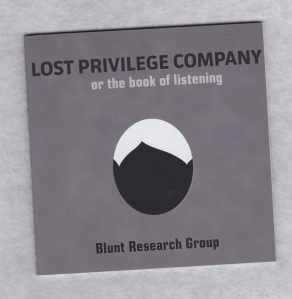
Blunt Research Group, Lost Privilege Company: or the book of Listening. Las Cruces, New Mexico: Noemi Press, 2016.
http://www.noemipress.org.
How does one write about a historical tragedy without exploiting it? This is the dilemma of any writer who makes use of the suffering of others to create a work–a work that will bring profit to the writer even as they present themselves as deep, caring, sensitive, politically engaged, etc. It has always seemed to me an unsolvable dilemma but a shifting group of “poets, artists, and scholars from diverse backgrounds” who go by the collective name Blunt Research Group may have proved me wrong.
As explained by the effectively dry opening essay (a deliberate strategy, I assume), these found poems have been constructed, or arranged, from texts found in case files dating from 1910 to 1925 and found in a California youth prison called the Whittier State School. The chapbook’s title is taken from the name of the school’s isolation ward, where teens–placed in the school for such offences as begging, walking the street at night, and sexual activity–were sent for misbehavior. The school was a kind of experimental laboratory, where teens considered incorrigible or mentally unfit or of unsound genetic background could be sentenced to compulsory sterilization, a practice that began in 1909 with the passing of a state law and continued until the 1940s. The files from which the poems were made, filled with statements by “fieldworkers” as well as the “wards” themselves, were compiled as evidence justifying what we now believe (and no doubt many at the time would also have believed) to be not merely wrong or cruel but criminal, perhaps sadistic, and no doubt racist. (A disproportionate number of the child inmates were Chicano and African-American.) This program of eugenics, which resulted in the publishing of papers, was a significant influence on the Nazi program of forced sterilization.
It is a valid question to ask whether a good, or proper use, of these files is to make poems out of them, but first let’s take a look at the poems themselves. Words by the teen wards are in italics or quotation marks, while the remarks of fieldworkers are in roman. There are seventeen of them, each given the name of the ward in question: Alec, Francis, Albert, Josephine, Oscar, Fred, Pedro, Theodore, Uriah, Ernest, Arthur, Javier, Raymond, William, Joseph, Carl, Helen. The poems are brief and fragmentary, making use of space so that they appear to me like cuts across the page. Here is “Fred” in its entirety, the only poem that only uses the subject’s words:
Won’t you forgive me for what
I have done today?
I have never had anyone love me, or anyone
who gave a ________ about me
you can send me to Lost Privilege Company
for saying that word
but it is the truth you have wrecked
all my wrong tendencies
Sometimes the poems record the reason for incarceration, such as “throwing peach pits” or being “crazy about soldiers and sailors”. Other times they imply a certain sympathy as the fieldworker records a child’s condition before coming to the school/prison: “and they wouldn’t let me to go my little sister’s / they used to punish me by not letting me see her”. Elsewhere, strange and sad dreams get spoken aloud (such as the title of this review).
To me, it is hard to imagine a more moving or effective group of poems with so specific a purpose–to bring these lost children to our attention and to make us at least begin to feel the depth of their misery. Perhaps they don’t rise above this purpose, but I don’t see any reason why they need to. Nor should one see the poems in isolation, without the opening essay or the chapbook’s third part, titled “the book of listening.” Here the anonymous authors themselves ask, in brief prose paragraphs, a variation of my own question: is it right to make use of the suffering of others? It is telling that instead of “writing,” “quoting,” or some other word to describe using the files, the group calls it listening:
The poem hovers between the necessity of asking permission to listen and the impossibility of obtaining it from a voice that cannot be reached.
They acknowledge the impossibility of getting that permission and the possibility of violation:
Needing to seek permission to listen begins by aknowledging the submerged will or disposition of voices that have been silenced. We presume that a lost voice would welcome the change to be heard, but this presumption ignores the need to ask permission. It is always possible that the unknown voice may insist on remaining silent. It may refuse permission.
All of these parts (including one more, a description of the group’s practises) add up to an informative, painfully moving, thought-provoking work. Quite remarkable for a book that is a mere five inches square and forty pages long.
– C.F.

